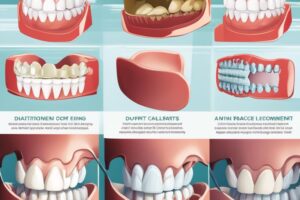Teeth are an important part of our oral health, and when it comes to wisdom teeth, proper understanding and care are crucial. Wisdom teeth, also known as third molars, can often cause issues such as impaction, infection, and overcrowding in the mouth. Understanding the reasons behind wisdom teeth removal and the benefits it can bring to overall oral health is key. Removing problematic wisdom teeth can prevent future dental complications, such as decay, gum disease, and even cyst formation. By delving into the process of wisdom teeth removal and its impact on oral wellness, individuals can make informed decisions to safeguard their dental health for years to come.
Key Takeaways:
- Regular dental check-ups are key in monitoring the growth and positioning of wisdom teeth to determine if removal is necessary.
- Early removal of impacted wisdom teeth can prevent potential oral health problems such as infection, cysts, and damage to surrounding teeth.
- Consulting with a dental professional can help individuals understand the reasons for wisdom teeth removal and ensure proper post-operative care for improved oral health.
Understanding Wisdom Teeth
Wisdom teeth, also known as third molars, are the last set of molars to emerge in the back of the mouth. They usually erupt between the ages of 17 and 25. Is Wisdom Tooth Removal Necessary? | GBDentalGroup
Anatomy of Wisdom Teeth
Teeth are characterized by their sharp edges designed for chewing and grinding food. Wisdom teeth are located at the farthest corners of the mouth, making them difficult to clean and susceptible to decay or infection due to their position.
The Developmental Stages of Wisdom Teeth
Teeth begin to develop in the embryonic stage, and by the teenage years, the wisdom teeth start to form. The eruption process varies for each individual, with some experiencing no issues, while others may face complications such as impaction, crowding, or misalignment.
As wisdom teeth continue to develop, they can become impacted, meaning they don’t have enough room to emerge properly. This can lead to various problems such as pain, infection, cysts, and damage to surrounding teeth. Regular dental visits and X-rays can help monitor the growth and development of wisdom teeth to determine if they need to be removed to prevent future oral health issues.
Indications for Wisdom Teeth Removal
Impacted Wisdom Teeth and Associated Risks
The presence of impacted wisdom teeth is a common reason for their removal. Impaction occurs when these third molars do not have enough space to emerge properly, causing them to remain trapped within the jawbone or gum tissue. This can lead to various issues such as infection, cyst formation, damage to neighboring teeth, and misalignment of the rest of the teeth.
Signs and Symptoms Necessitating Removal
Removal of wisdom teeth may also be necessary if they are causing pain, swelling, or tenderness in the back of the mouth. Other signs indicating the need for extraction include difficulty opening the mouth, persistent bad breath, and recurrent infections around the wisdom teeth. These symptoms can signify underlying problems that require prompt attention from a dental professional.
To ensure optimal oral health, it is crucial to address these indications for wisdom teeth removal promptly. Ignoring symptoms such as persistent pain or swelling can lead to serious complications including abscess formation, permanent damage to nearby teeth, and the development of cysts or tumors in the jaw.
The Procedure of Wisdom Teeth Removal
Pre-surgical Assessment and Planning
With proper planning and assessment, the process of removing wisdom teeth can be more efficient and successful. Before the surgery, the oral surgeon will conduct a thorough examination, including X-rays, to determine the position of the teeth and the best approach for extraction.
The Surgical Process and Techniques
Any extraction of wisdom teeth is done under local or general anesthesia to ensure the patient’s comfort. The surgeon will then make an incision in the gum tissue to expose the tooth and bone. Depending on the complexity of the case, the tooth may need to be divided into sections for easier removal.
A common technique used for impacted wisdom teeth is called ‘elevation and forceps removal.’ This involves loosening the tooth from the surrounding bone and ligaments before gently removing it with forceps. It’s crucial for the surgeon to be highly skilled to avoid complications such as nerve damage or infection.
Post-Operative Care and Recovery
Immediate Post-Surgical Care
Unlike other dental procedures, wisdom teeth removal is a surgical procedure that requires specific post-operative care to ensure a smooth recovery. To minimize discomfort and reduce the risk of complications, it is crucial to follow your dentist’s aftercare instructions diligently. This includes managing pain and swelling with prescribed medications, sticking to a soft food diet, avoiding strenuous activities, and maintaining proper oral hygiene.
Long-term Wellness and Oral Health Maintenance
The successful removal of wisdom teeth is just the beginning of your oral health journey. The long-term wellness and maintenance of your oral health depend on your commitment to practicing good oral hygiene habits and attending regular dental check-ups. By following a proper oral care routine, you can prevent future dental issues and maintain a healthy smile for years to come.
For instance, regular brushing and flossing are necessary for preventing plaque buildup, cavities, and gum disease. Additionally, incorporating routine dental visits every six months can help your dentist monitor your oral health and address any concerns before they escalate into more significant problems.
Potential Complications and Their Management
Common Post-Surgical Complications
Management: All surgical procedures carry some inherent risks, and wisdom teeth removal is no exception. Common post-surgical complications may include pain, swelling, bleeding, and infection. To manage these issues effectively, patients are advised to follow their dentist’s post-operative care instructions diligently. This typically involves taking prescribed pain medications, using ice packs to reduce swelling, and adhering to a soft diet to prevent bleeding.
Preventing and Managing Complications
Common: While complications after wisdom teeth removal are relatively rare, there are steps that can be taken to prevent and manage them. It is crucial for patients to adhere to all pre-operative and post-operative guidelines provided by their dental professional. This includes avoiding strenuous activities, refraining from smoking, and maintaining good oral hygiene. In the event of any unusual symptoms or complications, patients should immediately contact their dentist for guidance.
Preventing: The most important aspect of preventing complications after wisdom teeth removal is to follow all post-operative instructions provided by your dentist. These guidelines are designed to promote proper healing and reduce the risk of complications. Additionally, keeping the surgical site clean and avoiding disruptive behaviors, such as smoking or using straws, can aid in a smooth recovery process. Be mindful of, early detection and prompt intervention are key to ensuring a successful outcome.
Final Words
To wrap up, understanding the importance of wisdom teeth removal is crucial for improved oral health. By recognizing the potential issues that can arise from impacted or infected wisdom teeth, individuals can make informed decisions about their dental care. Consulting with a dental professional and discussing the best course of action for wisdom teeth removal can lead to better oral health outcomes in the long run. Remember to prioritize your oral health and take proactive steps to maintain a healthy smile!
FAQ
Q: What are wisdom teeth?
A: Wisdom teeth, also known as third molars, are the last set of teeth to erupt in the mouth, usually between the ages of 17 and 25. Most adults have four wisdom teeth, one in each corner of the mouth.
Q: Why do wisdom teeth need to be removed?
A: Wisdom teeth often become impacted, meaning they do not have enough room to emerge properly. This can lead to pain, infection, crowding of other teeth, and even damage to nearby teeth and bone. Removal is often recommended to prevent these issues.
Q: What is the process for removing wisdom teeth?
A: Wisdom teeth removal is typically done by an oral surgeon or a dentist. The procedure may involve local or general anesthesia, depending on the complexity of the case. The surgeon will make an incision in the gum, remove the tooth, and stitch the area closed. Recovery usually takes a few days to a week.






